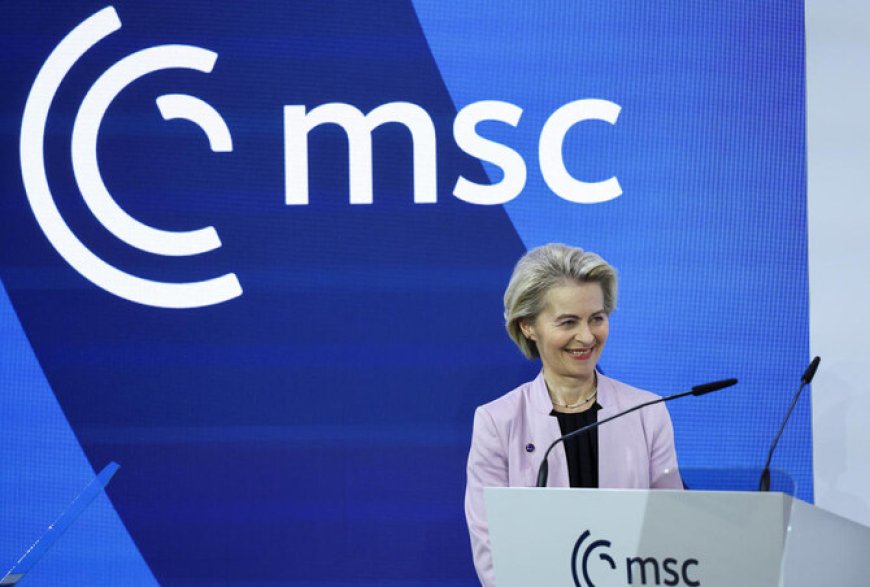The Geopolitical Consequences of a Failed Ukraine: A Call to Action for Europe and the United States
A stark warning was issued by European Commission President Ursula von der Leyen during an impassioned lecture at the Munich Security Conference: the fallout will not only harm Europe but also weaken the United States if Ukraine fails in its struggle against Russian aggression.

A stark warning was issued by European Commission President Ursula von der Leyen during an impassioned lecture at the Munich Security Conference: the fallout will not only harm Europe but also weaken the United States if Ukraine fails in its struggle against Russian aggression.
Von der Leyen's comments underscore the intricate interplay of geopolitical dynamics, national interests, and global security in the aftermath of Russia's invasion of Ukraine and reflect the gravity of the situation.
The war has entered its third year, and the stakes have never been higher. Her comments come at a pivotal time. The future remains uncertain, despite the fact that the Ukrainian resistance has been able to withstand Russian offensives, thanks to international support. Although Western leaders have been prompt to condemn Russia's actions and provide Ukraine with a variety of forms of assistance, von der Leyen's remarks emphasize the more extensive repercussions of a potential Ukrainian failure.
The security architecture of Europe will be disrupted, and the global reputation of the United States will be compromised if the Ukrainian government is unable to establish its sovereignty and emerge from this conflict in a position of strength, as per von der Leyen.
The European Union has consistently expressed its unwavering support for Ukraine, with countries such as Poland and the Baltic states viewing Ukraine's fate as inextricably linked to the EU's own security. However, von der Leyen's statements underscore a critical reality: Ukraine's survival is also directly linked to the broader transatlantic alliance, particularly the United States.
Under the Trump administration and its predecessors, Washington has played a prominent role in global security arrangements. Therefore, any disruption of Ukraine would have global repercussions, potentially undermining American influence and prestige.
Von der Leyen's appeal for a "just peace" is amidst an increasing apprehension that diplomatic solutions may be hastily pursued in an attempt to conclude the conflict, potentially at the expense of Ukraine's sovereignty. Forcing a peace agreement that fails to adequately address Ukraine's territorial integrity or security concerns could convey a perilous message to autocrats worldwide, particularly Russian President Vladimir Putin, regarding the West's willingness to negotiate with aggressors.
Not only would a peace that leaves Ukraine vulnerable embolden Russia, but it could also establish a concerning precedent for global diplomacy, in which powerful nations face minimal repercussions for territorial expansion.
In addition, von der Leyen's statements implicitly challenge the administration of U.S. President Donald Trump, which has occasionally demonstrated a lack of commitment to the defense of Ukraine, notably in terms of military intervention. Trump's "America First" policy has frequently prioritized domestic concerns over international alliances, and his statements regarding Ukraine have prompted apprehensions regarding his commitment to completely supporting European endeavors.
Von der Leyen's warning appears to be intended to persuade Washington that its interests are in harmony with those of Europe in order to guarantee Ukraine's success. In the end, a weakened Europe is a debilitated U.S.—economically, politically, and militarily.
The truth is that a failure in Ukraine would undermine the post-Cold War order that has supported Western alliances and international security. Russia would likely perceive the West as divided and weakened, and NATO's credibility would be devastated if Ukraine is unable to secure its future.
In such a scenario, the global balance of power could shift further in favor of authoritarian regimes, with Beijing and Moscow likely emboldened by a weakened West, in addition to the spreading instability on Europe's eastern frontier.
Von der Leyen's statement also underscores an uncomfortable reality: the EU and the U.S. continue to encounter substantial obstacles in their efforts to align their strategies in order to guarantee Ukraine's long-term security, despite years of support. The imminent inquiry pertains to the essence of the post-war order, rather than merely military aid or sanctions against Russia.
Ukraine's journey to peace is not solely about the cessation of the conflict; it is also about the establishment of an enduring peace that ensures its sovereignty, territorial integrity, and independence. This is not only a strategic imperative for the West, but also a moral one.
The West is faced with a critical decision: either to increase its investment in Ukraine's future or to risk witnessing an entire region sink into instability, which will have far-reaching consequences that extend beyond the confines of Europe. The clock is ticking, and the decision must be made quickly. Von der Leyen's words serve as a reminder that this issue is not exclusively European in nature, but rather global.
The United States, with its unparalleled economic and military influence, is unable to remain passive as the situation continues to deteriorate. In a world where the distinctions between local conflicts and global power transfers are becoming increasingly ambiguous, a failed Ukraine would not only erode Europe's strength, but it would also indicate a decline in Western influence on the global stage.













































